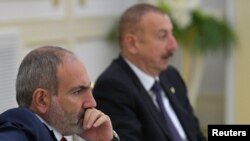The leaders of Armenia and Azerbaijan bickered over the disputed Nagorno-Karabakh region Saturday, highlighting their disparate positions and offering scant evidence that lasting peace was on the cards as they met in Munich.
Tensions between the two ex-Soviet neighbors have escalated over a two-month blockade of the Lachin corridor, the only land route giving Armenia direct access to Nagorno-Karabakh.
Armenian Prime Minister Nikol Pashinyan and Azeri President Ilham Aliyev's first face-to-face encounter since October began with talks hosted by U.S. Secretary of State Antony Blinken on the sidelines of the Munich Security Conference, following which both sides said progress on a peace deal had been made.
But at a subsequent panel discussion on "building security in the South Caucasus," the two men demonstrated how far apart the two sides remain on Nagorno-Karabakh, the Lachin corridor blockade and the direction of future negotiations.
Nagorno-Karabakh is internationally recognized as part of Azerbaijan, but its 120,000 inhabitants are predominantly ethnic Armenians, and it broke away from Baku in a first war in the early 1990s.
Azerbaijan regained much of the lost territory in a six-week conflict in 2020 that killed thousands and was ended by a Russia-brokered truce and the dispatch of Russian peacekeepers.
"I think Azerbaijan and Armenia need to demonstrate that the transition from long-lasting standoff, mutual hatred and hostility must end," Aliyev said during the panel.
The conciliatory tone ebbed away as he then accused Armenia of occupying Azerbaijan's lands for almost 30 years and criticized a senior Nagorno-Karabakh separatist official.
"Azerbaijan has adopted [a] revenge policy," Pashinyan said, going on to question whether they wanted to use their meeting for "enflaming intolerance, hate, aggressive rhetoric" or for making things better.
Peace proposals
Baku is studying Yerevan's draft peace proposals, Aliyev said. Russian news agencies reported that Aliyev also said Baku had proposed creating checkpoints on the border with Armenia.
Azeri civilians identifying themselves as environmental activists have been facing off since Dec. 12 with Russian peacekeepers on the Lachin corridor.
Yerevan says the protesters are government-backed agitators. Baku denies blockading the road, saying that some convoys and aid are allowed through, something Aliyev repeated Saturday.
Pashinyan said the last time a bus full of Armenian children had tried to pass through the corridor masked Azeri men had prevented them from doing so.
After the trilateral talks with Blinken, Pashinyan's office said he had reaffirmed Armenia's determination to reach an agreement that will "truly guarantee long-term peace and stability in the region."
Aliyev said: "I think (the peace agreement) could be a good example of how countries which had serious, historical disagreements can get together and turn the page of hostility."






